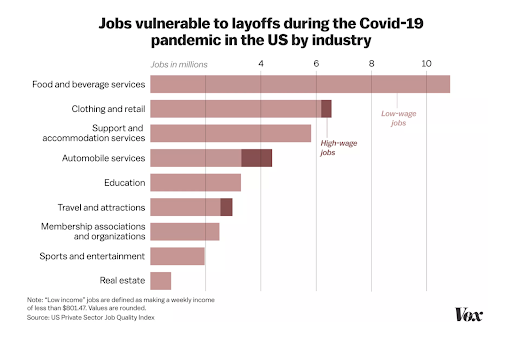Pandemic Recovery
Equitable Development Key to COVID-19 Recovery
While news of a forthcoming COVID-19 vaccine receives much attention amid the novel coronavirus’s most recent surge, the question of economic recovery from the pandemic remains critical. Without a stimulus package that could prevent the worst economic outcomes for millions of underserved and at-risk Americans, the question naturally emerges of what the structure of an effective recovery program would look like.
Fig. 1. The K-Shaped recovery graph shows industries with skilled labor beginning to recover, while unskilled workers continue to struggle, exacerbating extant inequality. Image source: https://www.forbes.com/sites/chuckjones/2020/10/24/three-charts-show-a-k-shaped-recovery/?sh=5a4df41d305f
Richard McGahey, an economist at the New School’s Schwartz Center, argues that a successful recovery from the COVID-19 pandemic must emphasize equitable development if it is to benefit Americans across the wealth distribution. McGahey is a former Director of Impact Assessment at the Ford Foundation, and his ongoing work investigates the role of cities in economic growth and inequality.
McGahey cites research showing that in New York City, a tight labor market prior to the pandemic was producing “real wage and income growth for the bottom half and for workers of color.” McGahey then notes that much of this progress has been wiped out by the pandemic’s impact on the labor market. He argues that the pandemic is exacerbating pre-existing inequality and structural racism and that designing an economic recovery approach aimed at getting back to normal will inevitably reproduce these problematic economic arrangements.
Fig 2. This graph shows that low-wage jobs have been far more vulnerable to layoffs during the COVID-19 pandemic. Image source: https://www.weforum.org/agenda/2020/05/workers-thrive-covid-19-skills/
McGahey argues that creating a new, more equitable “normal” will ultimately require intentionality by cities in redressing uneven economic development, disproportionate suburban power, and structural racism.
McGahey joins a growing chorus of economists calling for aggressive macroeconomic policy aimed at creating quality jobs, coupled with equity-focused economic policy at the city level. Current gridlock in Washington, however, renders ambitious proposals to leverage public spending into major jobs programs essentially infeasible.
An obvious question then emerges for impact investors: what is the role of the private sector in producing a more equitable post-COVID-19 economy? Given McGahey and colleagues’ observations from the New York City case study, it is clear that creating and retaining permanent, quality jobs in low-income communities (LICs) is critical to disrupting the advancing inequality that could be baked into recovery efforts that do not prioritize equity.
At LifeCity, we are proud to work with community development entities (CDEs) who prioritize this type of job creation in their investment decisions. Through the use of the federal New Markets Tax Credit (NMTC) program, these impact investors can facilitate job creation, community partnerships, and ecologically sustainable business practices that contribute to healthier and more equitable communities.
The need for economic policy aimed at equitable development is not new; however, given the historical propensity for crises to give way to problematic economic policy and increased inequality, the COVID-19 crisis represents an important inflection point that we have the opportunity to address in real time. Increasing equity in economic development has the effect of unlocking the entirety of a city’s economic potential by increasing access to jobs, entrepreneurship, ownership, and wealth—ultimately, creating a stronger and more competitive city economy. In this moment, it is as important as ever for both public and private sector actors to be intentional about centering equity in their economic recovery efforts.


